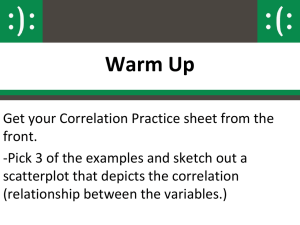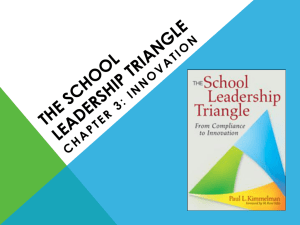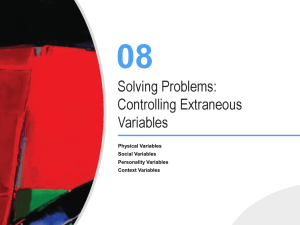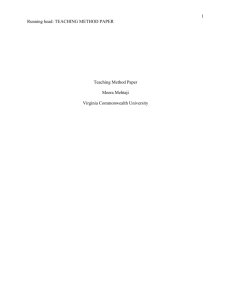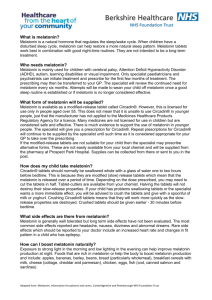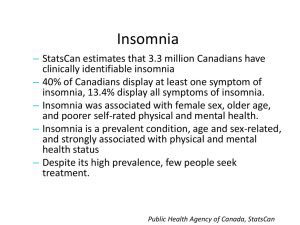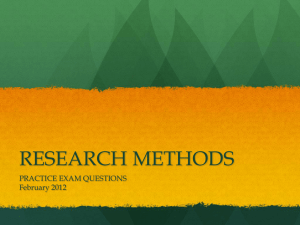Placebo end experimenter effects
advertisement
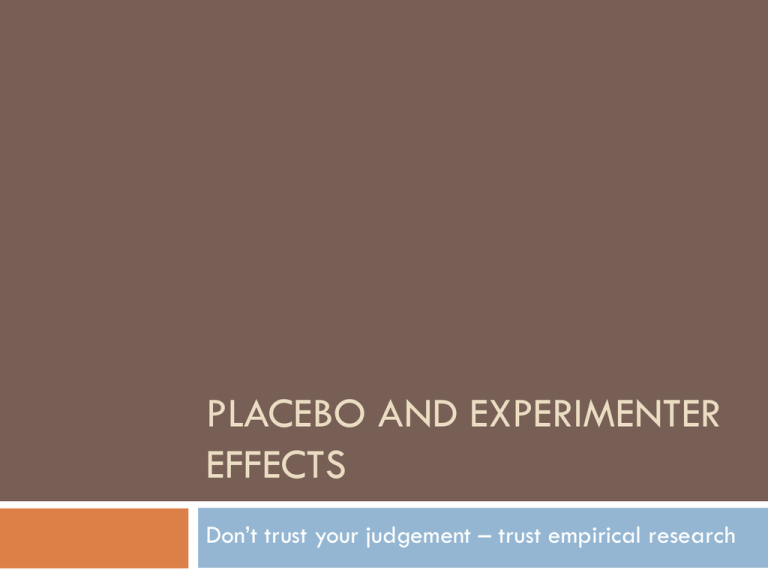
PLACEBO AND EXPERIMENTER EFFECTS Don’t trust your judgement – trust empirical research Example of Research I want to test the effect of Melatonin on Insomnia VARIABLES The Independent Variable is Melatonin (this is what I want to see the effect of, what I am going to vary or manipulate, I am going to get people to take melatonin or not take melatonin) The Dependent Variable is Insomnia (this is what I am going to measure to see any effect the IV has had, I am going to measure the quality of participants sleep(who have previously had trouble sleeping), I am going to measure how many hours of uninterrupted sleep they have after taking or not taking melatonin) Experimental and Control Groups Group One is the Experimental group – they were exposed to the IV (taking melatonin) Group Two is called the Control group – they were not exposed to the IV (not taking melatonin) Now I can compare the difference in quality of sleep of people who took melatonin Vs those who did not. Extraneous variables…. Lets assume these have been controlled Our sample is stratified and large We have used a matched participants design We have operationalised our hypothesis The Placebo Effect The placebo effect occurs when a participant's behavioural response is influenced by their expectation of how they should behave The expectations of the participants rather than (or as well as) the independent variable, may be affecting the dependent variable and therefore the results For example, the participants in the above study think that they have had a better nights sleep after taking melatonin. However their experience of having a better nights sleep may have been caused by their expectation that the melatonin would make them sleep better In this case feeling like they slept better is a result of the belief that they will sleep better not a result of the melatonin (IV) itself. Controlling the Placebo Effect Single Blind Procedure A single blind procedure involves allocating participants to groups so that they are "blind" to the knowledge of which group they are in: experiment or control For example in the study mentioned above I could give both groups (experimental and control) a pill to take. One type of pill will contain melatonin, the other will be a sugar pill with no active ingredients. Now participants don’t know which pill they have taken (melatonin or sugar) thus they do not know what group they are in (experiment or control) and their behaviour is therefore not likely to be influenced by their expectations! The Experimenter Effect The experimenter effect refers to the actions of the experimenter, rather than (or as well as) the independent variable, affecting the dependent variable, and therefore the results of the experiment The experimenter effect can take two forms The Experimenter Effect Self-fulfilling prophecy - participants behave in line with the way they believe the experimenter wants them to behave because the experimenter unintentionally suggests to the participants how to respond For example in the study mentioned above the fact that the experimenter knows that it was jimmy who took the melatonin may cause the experimenter to unintentionally treat jimmy differently thereby effecting Jimmy’s responses The Experimenter Effect Experimenter Bias - unintentional actions that may occur in the collection and treatment of experimental data. E.g. Wrongly interpreting a participant's response So the experimenter’s expectation that the IV (taking melatonin) will be effective has influenced their judgement of the participants responses Controlling the Experimenter Effect Double-blind procedure The allocation of participants to groups so that both the experimenter and the participants are "blind" to the conditions to which the participants have been allocated For example in the study mentioned above I could get research assistants to hand out the pills so my experimenters don’t know who is in which group OTHER RESEARCH DESIGN PROBLEMS Now what else can go wrong? Demand Characteristics How the research is conducted could alter how participants behave Social research is particularly vulnerable to this effect People don’t respond ‘naturally’ rather they respond in line with what they perceive as the required outcome of the experiment Participants do their best to be ‘good participants’ They do things they think the experiment requires, not what they would usually do! Demand characteristics can also be related to the way the experimenter communicates with participants (subtle hints) or how the research is set up. Are people really responding spontaneously or are the altering their behaviour to do what they think is ‘right’? Artificiality Simply being in a lab can change the way people respond Trying to study ‘real life’ while in the lab is a problem Can limit the ability to generalise from the lab results Non standardised procedures Not all participants are treated the same or receive identical instructions or conditions A source of extraneous variables Researchers always try to avoid this at all costs! CASE STUDIES IN PLACEBO AND EXPERIMENTER EFFECT Homeopathy and the Power Balance bracelet Homeopathy and Power Balance Both make claims about health and wellbeing Both conduct ‘research’ to back their claims Both show no understanding of the empirical/scientific method Clients of each experience the placebo effect Researchers in each area suffer the experimenter effect These people mean well, they are not lying, they simply do not understand how to do good research
